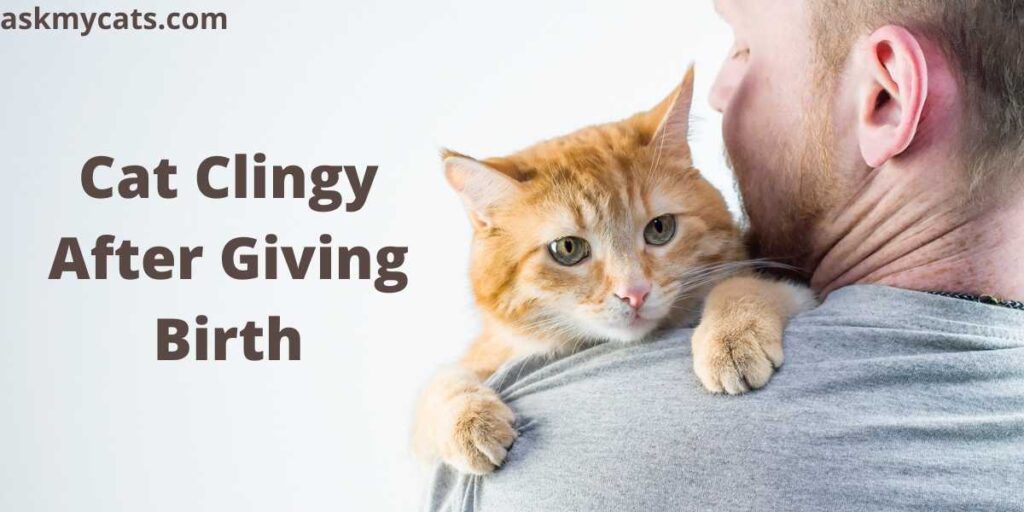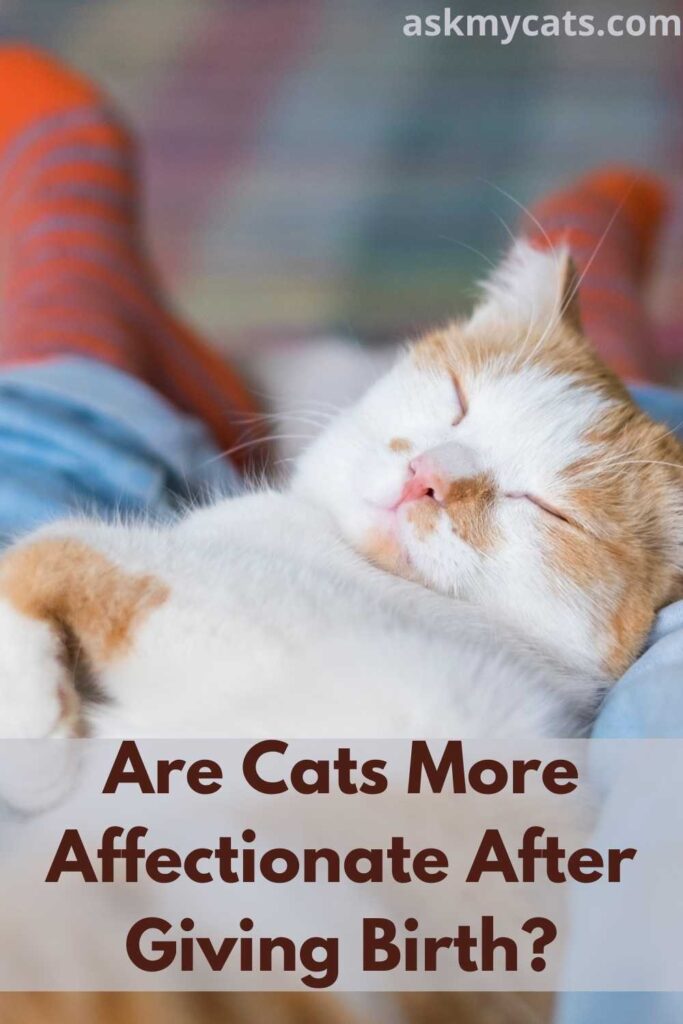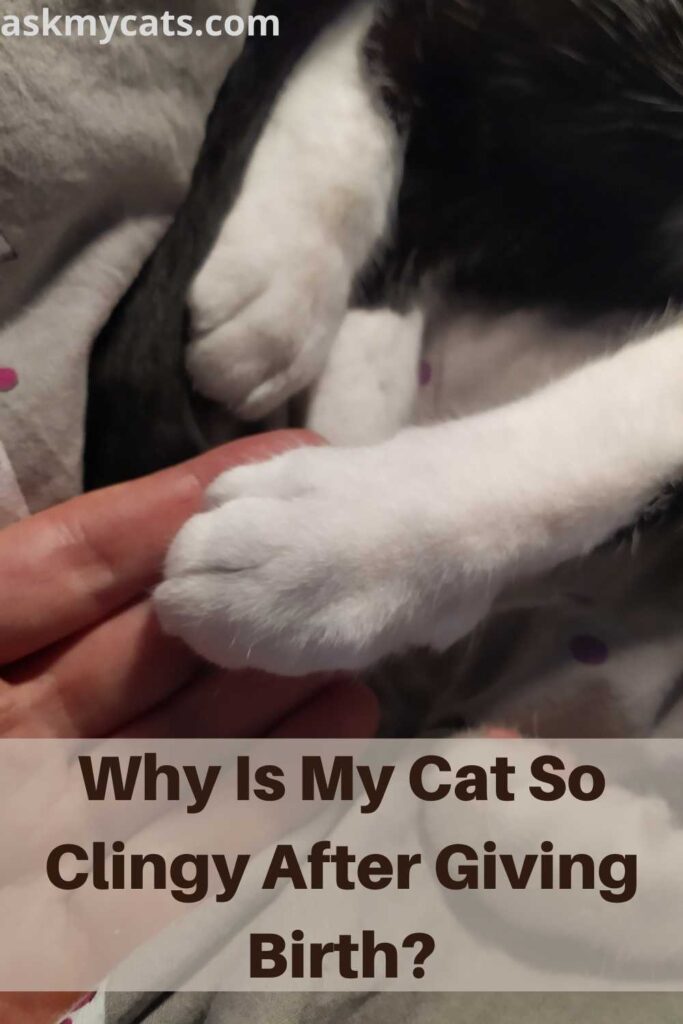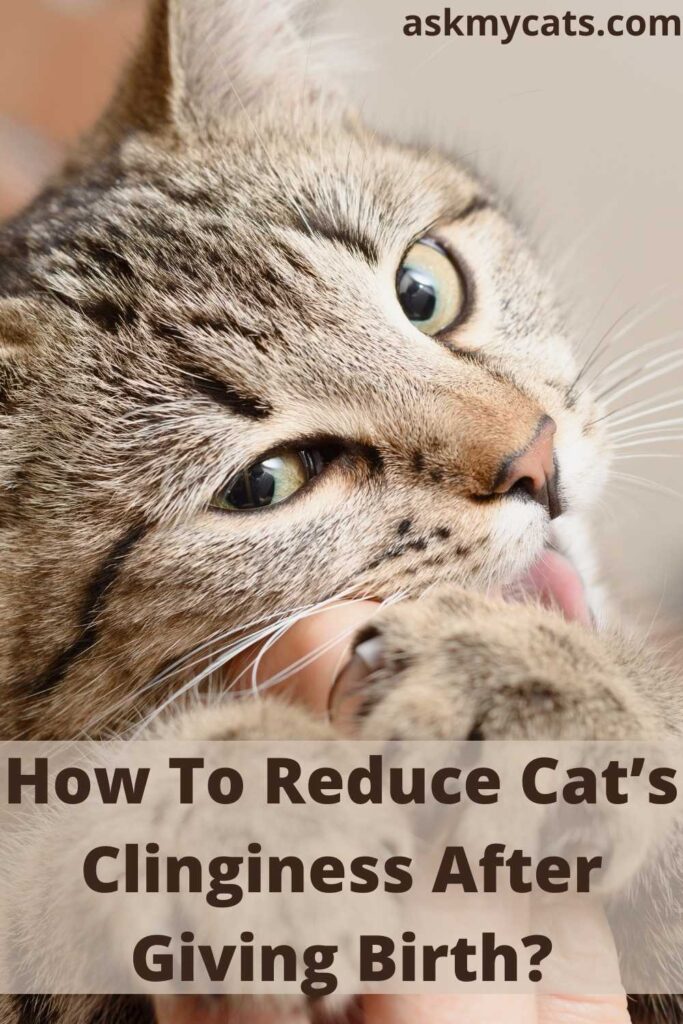When you consider the number of feral cats in the wild, it’s tempting to believe that cats don’t require human help when they’re going to give birth or have already given birth.
While it’s true that mother nature normally takes over and cats get along great on their own, if you have a pet cat who has given birth, keep an eye on the mother cat’s behavior toward her kittens as well as her overall health to ensure that everything is in order.
So, why does a cat become clingy after giving birth?
There could be many reasons behind your cat becoming clingy after giving birth like separation anxiety or stress.
Keep reading this article to know more about the reasons behind your cat getting clingy after giving birth.


Give Your Cat the Perfect Day
Get the Free Ebook!
Are Cats More Affectionate After Giving Birth?
Yes, some cats can become more affectionate after giving birth.

A cat’s body is exhausted after giving birth, and they want assistance and comfort from its human.
She’s probably just looking for some extra cuddling and affection, after all, she did just give birth to live. That must have taken a lot out of her.
She doesn’t mind you getting near the kitten because she trusts you; you’re her human, and she has no reason to suspect you’d hurt it and everything to believe you’ll look after it.
She would have her litter alongside a sister or mother if she were a feral cat.
They would look after each other’s kittens. You’re her family, so you get to assist with kitten rearing. You are extremely fortunate!
A singlet isn’t unheard of in a cat, especially if it’s her first (and hopefully last) litter.
She’s probably looking for reassurance, love, and possibly for you to watch the kitten while she rests. Motherhood is difficult.
She’s just been through a lot, and she obviously wants your attention, so please pay attention to her.
And, yes, there could be something seriously wrong. There could be something wrong there, especially if your cat is very young and has no idea what is going on.
She could simply be too young, scared, and in need of your support and comfort. I had several mama kitties who wanted me to be with them before, during, and after giving birth. (I was very attached to all of my cats.)
Make certain you’re feeding her properly. When mama cats are nursing, they require additional food.
Keep a bowl of fresh water and a fresh bowl of her food nearby and allow her to free-feed to ensure she gets enough.
If you feed her on your schedule, she is most likely not getting enough nutrition to produce milk for her babies.
Your cat is vulnerable. Since they have just given birth, it is instinctive for them to cling to their owners or anyone who cares for them.
They’re exhausted. They wouldn’t be able to react quickly enough to defend their pups if a predator attacked them unexpectedly.
She is confident that someone will look after her and her children. That’s why she’s clingy and close to you.
If she doesn’t calm down soon, take her to the vet.
I'm pregnant and my cat follows me everywhere, know the probable reasons.
Why Is My Cat So Clingy After Giving Birth?
Here are some reasons of your cat gets so clingy after giving birth: –

1. Separation Anxiety
A cat may become extremely attached as a result of separation anxiety or another nervousness-related disorder.
Although cats do not suffer from separation anxiety as severely as other pets, more sensitive cats can exhibit clinginess as a symptom of separation anxiety.
Pandering to cats while they are young is the easiest approach to prevent separation anxiety.
Separation anxiety causes cats to feel uneasy or frightened in their early days.
Trying to contact your cat on a regular basis will go a long way toward preventing this problem from arising.
By altering the typical routine, it may be feasible to make the time leading up to the owner’s departure less stressful for the cat.
Prior to leaving and returning home, the owner should ignore the cat — it is the loss of the owner’s attention that creates the stress, thus focusing on the cat 100% of the time the owner is around would actually exacerbate the problem rather than making the cat feel safer.
Making the cat’s habitat more engaging may assist; for example, a comfy sleeping space with a window view might give entertainment, particularly if a bird feeder is nearby.
Leaving a radio or television on low can be soothing and help to fill the silence. If nervousness persists, your veterinarian may prescribe medication or recommend you to a behavior specialist.
2. Health Problems
Many cats will go to considerable pains to conceal any injuries or illnesses, however, this is not true of all domesticated cats.
Some cats, on the other hand, will do the exact opposite. They will become clingy as a result of their need for safety and assistance in you.
If your cat is clingy due to a medical condition, you will most likely notice other signs of the sickness.
Weight loss, a lack of appetite, lethargy, and seizures are all common adverse effects in cats that have health concerns. Look for these signs to see if the clinginess is due to a health problem with the cat.
As their cognitive abilities deteriorate, older cats will become increasingly clinging. When a cat’s vision, hearing, coordination, and other faculties begin to deteriorate, this is referred to as cognitive dysfunction. They become reliant on your leadership.
Clinginess isn’t always a sign of a serious health concern. When a female cat first becomes pregnant, she may become clingy.
Regardless of whether you believe the clinginess is caused by a negative health issue or pregnancy, take your cat to a veterinarian as soon as possible to get to the bottom of the matter.
3. Stress
Cats enjoy following your routines. If you make a change in their household that causes stress, they may become clingy to reclaim part of that routine.
Your cat may become clingy for your protection if you have a new visitor, there is a storm outside, or fireworks are going off.
The simplest way to tell if your cat’s clinginess is due to stress is to pay attention to when they are clingy.
If they cling to you seldom and at random, it’s most likely due to a traumatic event in your home.
4. New Family Member
The arrival of a new family member is a more particular example of a cat becoming clingy after giving birth due to stress.
Cats, as previously said, dislike having their habits disrupted. The addition of a new family member is a significant change in routine that may make your cat feel overwhelmed and unappreciated.
It is much easier to identify this as the source of the problem. Assume your cat’s behavior changed dramatically after you introduced a new family member.
In that circumstance, kids are likely to become more clingy as a result of the new family member’s stress or lack of appreciation.
5. Boredom
Clinginess can be an indication of a variety of problems, but it can also be a sign of boredom.
Cats require a great deal of mental stimulation. If they don’t get it, they’ll use any means at their disposal to force mental stimulation.
Clinginess caused by boredom will frequently manifest itself in the form of constant touching or attempts to play with you in some way.
You might also like to know about how soon can a cat get pregnant after having kittens
How To Reduce Cat’s Clinginess After Giving Birth?
Here are some ways you can reduce your cat’s clinginess after giving birth.

1. Given Them More Attention
In many circumstances, simply giving your cat more attention on a daily basis may suffice.
This is particularly true if your cat becomes clingy as a result of a new family member or boredom.
To establish a habit, pay them more attention and do so at the same time every day.
When you’re paying attention to them, attempt to include mentally stimulating items to keep them entertained and involved.
Laser pointers, sometimes known as feather wands, are an excellent method to attract your cat’s attention while also encouraging them to use their minds.
2. Discourage Bad Behavior
If your cat is clinging, you should definitely pay extra attention to them, but you should not give in to every desire.
If your cat is scratching or engaging in any other bothersome and perhaps harmful activity, ignore them altogether.
Ignoring poor behavior sends the message to your cat that it isn’t working. As a result, they’ll be less likely to do so.
Do not penalize the cat when you want to discourage negative behavior. Cats don’t respond to punishment in the same way that other animals do.
Instead, congratulate them on the behavior that you admire. Your cat will be more inclined to engage in those activities and refrain from engaging in those you wish to discourage.
3. Take Them To The Vet
If you suspect your cat’s clinginess is the result of a health problem, see a veterinarian right once.
They could be suffering from a disease or condition that requires medical attention. A pregnant female cat is also a possibility.
If a health condition is discovered to be the cause of your cat’s clinginess, make sure to treat the ailment appropriately and be patient with your cat.
Continue to give them a variety of attention and be kind to them during the treatment.
Frequently Asked Questions
How much will it cost to cure clinginess in cats?
There are treatments available for your cat’s separation anxiety. Separation anxiety treatment for cats starts at around $500 for a cat therapist. The amount of time your therapist will need to spend with him, as well as any prescription medications, will determine this.
What factors should be considered when choosing a site for a cat’s birth?
Select a quiet spot free of dampness and frigid air. It should be faintly lit instead of brightly lit. If she has a favorite piece of your clothing that she likes to sleep in, you can also include a nightie or T-shirt in the box. Show your pregnant mother her birthing box and encourage her to sleep in it. Consider moving it to a more tranquil spot if she looks to be upset with it.
When should I begin to wean my kittens?
Weaning is frequently done in stages. Between the ages of three and four weeks, most kittens start eating solid food. Weaning should be completed between the ages of 6 and 10 weeks. Remove the mother and kitten for a few hours at a time to start the weaning process. As a result, the kittens’ reliance on their mother and her milk will gradually diminish. Both the mother and the kitten should have their own area with food, water, and a litter box.
Final Words
Cats might become clingy after giving birth for a variety of reasons. Some of the most common causes of increased clinginess in cats include separation anxiety, health issues, stress, a new family member, and boredom.
There are a few things you can do to make your cat less clingy. The specific treatment will be determined by the cause of your cat’s clinginess.
Remember to be patient and understanding no matter how you choose to decrease your cat’s clinginess. You are the center of their universe. It’s understandable that they can get clinging at times.
If you have any questions, ask us in the comments section.
